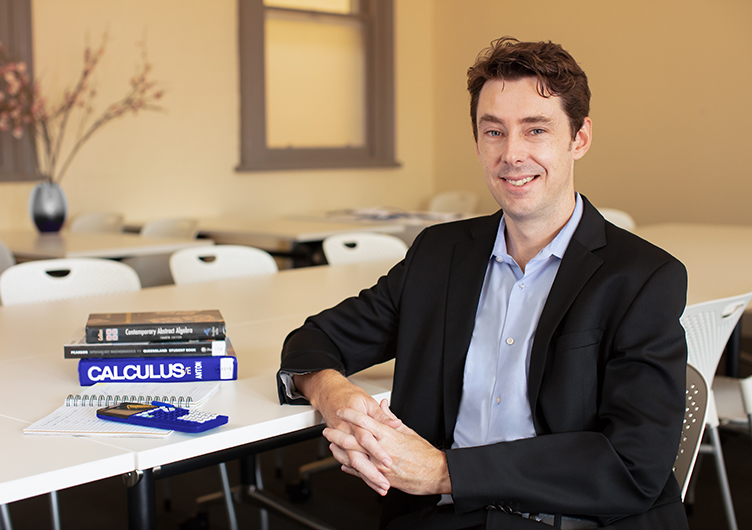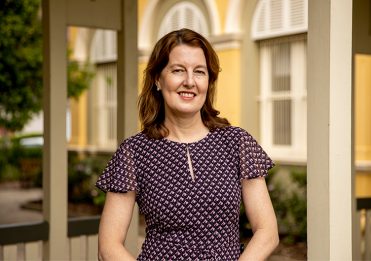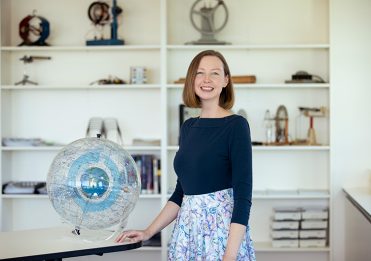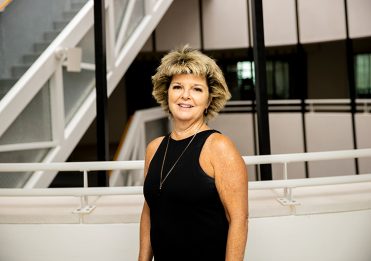
Dr Pete Jenkins, Head of Mathematics Curriculum Development and Tennis Coordinator, has a true passion for pure mathematics.
Mathematics has always been a joy and a struggle for me. I’ve always enjoyed learning about mathematical ideas: there’s an aesthetic quality to the patterns and structures that are hidden in the universe that mathematics is able to illuminate. It takes effort, but the more time you spend studying and exploring the intricacies of these patterns and structures, the more satisfying you find the experience.
Although I remember enjoying mathematics from a young age, I remember always finding it very challenging. Like many students I suspect, I often had the sense that I wasn’t naturally good at it, and had to spend more time wrestling with new or complex ideas than other people did. This actually never bothered me too much—I remember my dad often telling me ‘If something is easy, it’s not worth doing.’ I was also fortunate enough to have some very inspiring mathematics teachers at high school that not only helped bring a lot of clarity to the subject, but also helped me become much more confident—so much so that I decided to study mathematics at university.
I completed a Bachelor of Science degree, majoring in Mathematics and Computer Science at The University of Queensland. I then completed Honours and eventually a PhD in Mathematics. Completing a PhD in any field is incredibly challenging as you need to contribute something original to your field. For mathematics, this means trying to solve problems without knowing if solutions even exist. You can spend months not making any progress, but it is extremely satisfying if you find a way to gain new knowledge.
My PhD was based on attempting to solve one part of a very broad problem in pure mathematics known as the ‘Embedding Problem’. Unfortunately I can’t point to anything in everyday life and say ‘it’s used here!’, however there are applications in related areas of mathematics. While I wasn’t able to completely solve the problem, I managed to make significant progress, and in the process developed and proved number of theorems that were published in international journals.
While I was completing my PhD, I lectured into a number of undergraduate Mathematics courses. Given how much I enjoyed teaching, I thought that teaching at the secondary school level would allow me to have an even greater impact on students, and so completed a graduate Diploma in Education.
I was lucky to come to Girls Grammar for my second practical placement, and was able to stay on after that finished. That was about 15 years ago. Now there are only two other Maths teachers who have been here longer than me! I love my role at the School. It allows me to teach and be involved in curriculum and assessment decisions across all our mathematics courses and year levels, with a particular focus on Mathematics C and Specialist Mathematics.
I also coordinate Tennis at the School. I really like the culture we have within Tennis at Girls Grammar. We have some incredibly gifted high performing players in our Open and Junior A teams, but at the same time we have a lot of girls who simply want to have a bit of fun and improve their tennis at the same time. I truly enjoy watching the fixture matches—there is some really thrilling tennis being played and many matches go down to the wire—they are very exciting.
Outside of school I enjoy playing tennis myself frequently, and now that I’m an old man, aged over 35, I’ve started competing in many of the ITF senior tournaments.
Much of my time recently has also been spent writing several textbooks for the new senior Specialist Mathematics subject in conjunction with my friend and former Director of Mathematics at the School, Greg Bland, and colleague Gillian Anderson. The textbook is now used in many different schools across Queensland.
My teaching style is similar, I’d like to believe, to the best mathematics teacher I had at high school, Mr Peter Coyne. I remember him being extremely organised, calm and helpful, and he was very good at organising challenging ideas in a way that was logical and clear, without oversimplifying things. Reflecting on what made him so good at this, I think the most challenging thing for teachers (that he seemed to do well) is to get past the ‘curse of knowledge’—as you become more and more familiar with certain ideas, it becomes harder and harder to appreciate what it must feel like for someone who doesn’t yet have that knowledge and understanding. The best teachers seem to be able to put themselves in the shoes of their students, and remember what it was like to be meeting the relevant ideas for the first time. I’d like to think I’m able to do this, and the fact that I did often struggle making sense of new ideas initially makes this possible.
The best advice I can give to students is that mathematics is not a competition to see who can understand something or solve a problem the fastest. We all learn in different ways, and although some students are very good at processing new information readily and asking insightful questions in class, others may find it hard at first, but when they are given time and space, they can develop the same or even a deeper level of understanding. The key is to embrace the challenge and not wish that it was easy. I also think it’s important to set realistic goals. It takes a lot of time and effort to improve at mathematics, so you shouldn’t look for the quick fix. You need to find some aspect of the experience of doing mathematics that is engaging, so you will genuinely want to spend time on it; improvement will follow.




